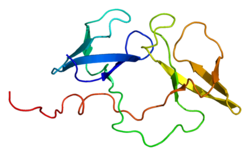脆性信使核蛋白1
外观

脆性X信使核蛋白1(英語:Fragile X Messenger Ribonucleoprotein 1, FMR1)是人类基因[6],其编码的蛋白质是脆性X信使核蛋白(fragile X messenger ribonucleoprotein , FMRP)[7],常见于大脑,对正常的认知发育和女性生殖功能起关键作用。FMR1基因的突变会导致X染色體易裂症、智能障礙、原發性卵巢功能低下、孤独症谱系障碍、帕金森氏病、发育迟缓和其它认知缺陷。[8]FMR1前突变与广泛的临床表型相关,在全世界的患者高达两百万之多。[9]
功能
[编辑]突触可塑性
[编辑]FMRP在各种神经元具有广泛功能,但这些功能还没有完全确定。有证据表明FMRP在mRNA的核质穿梭、树状细胞mRNA定位和突触蛋白质合成中起作用。[10]
参考文献
[编辑]- ^ 與X染色體脆折症相關的疾病;在維基數據上查看/編輯參考.
- ^ 2.0 2.1 2.2 GRCh38: Ensembl release 89: ENSG00000102081 - Ensembl, May 2017
- ^ 3.0 3.1 3.2 GRCm38: Ensembl release 89: ENSMUSG00000000838 - Ensembl, May 2017
- ^ Human PubMed Reference:. National Center for Biotechnology Information, U.S. National Library of Medicine.
- ^ Mouse PubMed Reference:. National Center for Biotechnology Information, U.S. National Library of Medicine.
- ^ Verkerk AJ, Pieretti M, Sutcliffe JS, Fu YH, Kuhl DP, Pizzuti A, Reiner O, Richards S, Victoria MF, Zhang FP. Identification of a gene (FMR-1) containing a CGG repeat coincident with a breakpoint cluster region exhibiting length variation in fragile X syndrome. Cell. May 1991, 65 (5): 905–14. PMID 1710175. S2CID 21463845. doi:10.1016/0092-8674(91)90397-H.
- ^ Verheij C, Bakker CE, de Graaff E, Keulemans J, Willemsen R, Verkerk AJ, Galjaard H, Reuser AJ, Hoogeveen AT, Oostra BA. Characterization and localization of the FMR-1 gene product associated with fragile X syndrome. Nature. June 1993, 363 (6431): 722–4. Bibcode:1993Natur.363..722V. PMID 8515814. S2CID 4331494. doi:10.1038/363722a0. hdl:1765/56659
 .
.
- ^ "Fragile X Messenger Ribonucleoprotein 1" The Human Gene Compendium
- ^ Milà M, Rodriguez-Revenga L, Matilla-Dueñas A. FMR1 Premutation: Basic Mechanisms and Clinical Involvement. Cerebellum. October 2016, 15 (5): 543–5. PMID 27338822. S2CID 16002209. doi:10.1007/s12311-016-0808-7.
- ^ Antar LN, Dictenberg JB, Plociniak M, Afroz R, Bassell GJ. Localization of FMRP-associated mRNA granules and requirement of microtubules for activity-dependent trafficking in hippocampal neurons. Genes, Brain and Behavior. August 2005, 4 (6): 350–9. PMID 16098134. doi:10.1111/j.1601-183X.2005.00128.x
 .
.







